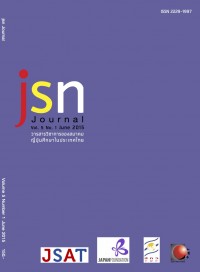การย้ายถิ่นเพื่อเปลี่ยนวิถีชีวิตของคนญี่ปุ่น: กรณีศึกษาคนญี่ปุ่นวัยเกษียณในจังหวัดเชียงใหม่ ประเทศไทย
Main Article Content
Abstract
จากการสัมภาษณ์พบว่ามี 5 ปัจจัยหลักที่คนญี่ปุ่นพึงพอใจในการพำนักที่เชียงใหม่มากกว่าที่ญี่ปุ่น ซึ่งได้แก่ (1) การมี อิสระจากกฎเกณฑ์ทางสังคมญี่ปุ่นที่เคร่งครัด (2) ค่าครองชีพ ที่ถูกกว่าเมื่อเทียบกับที่ญี่ปุ่น เนื่องจากค่าเงินที่ใช้จ่ายให้ความ คุ้มค่าที่มากกว่า (3) สภาพแวดล้อมที่เอื้ออำนวยต่อการดำเนิน ชีวิต (4) ความง่ายต่อการปรับตัวเข้ากับวัฒนธรรมไทย เพราะ คนญี่ปุ่นสามารถพำนักโดยใช้วัฒนธรรมญี่ปุ่นและไทยร่วมกัน (5) การมีกลุ่มคนญี่ปุ่นให้ความช่วยเหลือด้านต่างๆ ที่จำเป็นต่อการ ดำเนินชีวิตที่เชียงใหม่
ผลการศึกษาครั้งนี้ สรุปได้ว่า การย้ายถิ่นเพื่อเปลี่ยน วิถีชีวิตที่เชียงใหม่เป็นการย้ายถิ่นของประชากรรูปแบบใหม่ซึ่ง สลับขั้วกับการย้ายถิ่นรูปแบบทั่วไป กล่าวคือผู้คนจากประเทศที่ เศรษฐกิจขนาดใหญ่กว่าย้ายถิ่นไปยังประเทศที่เศรษฐกิจเล็กกว่า เพื่อการดำเนินชีวิตหลังเกษียณ การย้ายถิ่นรูปแบบนี้เป็นการ ย้ายถิ่นที่ไม่มีความจำเป็นต้องย้าย แต่เป็นการเคลื่อนย้ายตาม ความประสงค์ระดับปัจเจกบุคคลที่ต้องการเปลี่ยนวิถีการดำเนิน ชีวิต คนญี่ปุ่นเคลื่อนย้ายไปเชียงใหม่เพื่อค้นหาการดำเนินชีวิตที่ ดีกว่าทั้งทางร่างกายและจิตใจ
Lifestyle Migration of Japanese: A Case Study of Retired Japanese in Chiang Mai Province, Thailand
Sutpratana Duangkaew*
This article attempts to convey how the lifestyle of retired Japanese citizens living in Chiang Mai province is like and to define “lifestyle migration”. Information was collected by interviewing 23 Japanese participants.
From the interviews, five main factors were found that make the participants more satisfied with living in Chiang Mai rather than living in Japan. The factors are: (1) freedom from the inflexible rules imposed by Japanese society, (2) a cheaper cost of living as compared to living in Japan resulting in more value for their money, (3) a good atmosphere, (4) easy to assimilate into the Thai cultural because they are able to stay by easily adapting to both Thai and Japanese cultures, and (5) the ability to seek assistance from the Japanese support groups already living here when needed to continue life in Chiang Mai.
The conclusion from this study is that ‘lifestyle migration’ in Chiang Mai is a new pattern of human migration which is directly opposed to the general migration pattern. Namely, in general migration, people usually flow in from countries with a better economy to countries with a less-developed economy for living after retirement. There is no need for migration because it is occurring from the decisions of the individual to change their lifestyle. By moving to Chiang Mai, the Japanese are able to seek a better lifestyle, both physically and mentally.
* Doctoral candidate, Graduate School of Humanities and Social Sciences, University of the Ryukyus, Address: 1 Senbaru, Nishihara-cho, Nakagami-gun, Okinawa, Japan
Article Details
ข้อความและข้อคิดเห็นต่างๆ ในบทความเป็นของผู้เขียนบทความนั้นๆ ไม่ใช่ความเห็นของกองบรรณาธิการหรือของวารสาร jsn Journal


